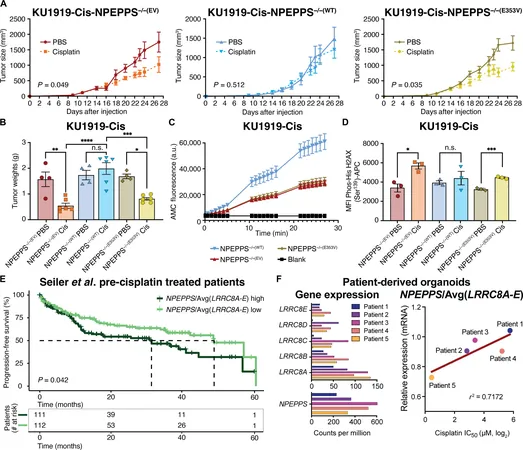
Revolutionary Gene Inhibition Technique Unlocks New Strategy to Beat Cancer Drug Resistance!
2024-12-16
Author: Siti
Revolutionary Gene Inhibition Technique Unlocks New Strategy to Beat Cancer Drug Resistance!
In a groundbreaking study from Cedars-Sinai Cancer, researchers have unveiled a promising method to tackle the frustrating resistance many tumors exhibit against the widely utilized chemotherapy drug cisplatin. Published in the esteemed journal Science Advances, these findings hold the potential to not only enhance the effectiveness of cisplatin but also reduce its necessary dosage, leading to fewer side effects for patients.
Dr. Dan Theodorescu, MD, Ph.D., the director of Cedars-Sinai Cancer and a co-senior author of the study, expressed excitement over the findings: "By inhibiting a specific gene that restricts the import of cisplatin into cancer cells, we can significantly increase the drug's uptake and efficacy. This presents a druggable target to enhance patient responses, particularly in advanced cancer cases. Our research has shown promising results across various cancer types, paving the way for broader applications of cisplatin therapy."
Cisplatin is a fundamental component in the treatment protocols for numerous cancers, including, but not limited to, bladder, ovarian, cervical, testicular, lung, and breast cancers, as well as various hematologic malignancies like lymphomas and leukemias. Approximately half of all chemotherapy patients receive platinum-based therapies designed to damage the DNA of cancer cells and inhibit their proliferation. However, the ability of tumor cells to evade the drug's effects frequently results in advanced cases remaining untreated effectively.
To identify solutions to this issue, a collaborative team from Cedars-Sinai, the University of Colorado Anschutz Medical Campus, and Erasmus University Medical Center in the Netherlands conducted experiments with bladder cancer cells in lab mice, cell cultures, and organoids derived from patients’ bladder cancer samples. These organoids mimic actual tumors and provide a realistic platform for testing potential treatments.
The research revealed that inhibiting a gene known as NPEPPS enhanced the sensitivity of cancer cells and organoids to cisplatin. This exciting discovery marks the first time the role of NPEPPS in cisplatin resistance has been documented, further emphasizing its importance across different cancer types and in patients previously treated with platinum-based therapies.
In addition, previous studies have indicated that combining platinum-based chemotherapy with immunotherapy can optimize immune responses, which could amplify the impact of these latest findings, according to Dr. Theodorescu.
Dr. James Costello, Ph.D., an associate professor of Pharmacology at the University of Colorado Anschutz Medical Campus and co-senior author of the study, elaborated on the mechanics involved: "Cells possess channels on their surfaces that regulate the in-and-outflow of substances. Our research shows that NPEPPS is activated in response to platinum drugs, effectively blocking these channels from importing the drugs. By developing strategies to target and inhibit NPEPPS, we can re-open these gateways for better drug absorption."
This innovative approach could lead to new therapeutic strategies not only in enhancing the effectiveness of cisplatin but also in understanding the intricate interactions between cancerous and normal cells, including those with the immune system. The potential implications of this research are vast, making it an exciting time in the fight against cancer and its formidable resistance mechanisms. Stay tuned for further updates as this research progresses, potentially transforming the lives of countless patients battling cancer!


 Brasil (PT)
Brasil (PT)
 Canada (EN)
Canada (EN)
 Chile (ES)
Chile (ES)
 España (ES)
España (ES)
 France (FR)
France (FR)
 Hong Kong (EN)
Hong Kong (EN)
 Italia (IT)
Italia (IT)
 日本 (JA)
日本 (JA)
 Magyarország (HU)
Magyarország (HU)
 Norge (NO)
Norge (NO)
 Polska (PL)
Polska (PL)
 Schweiz (DE)
Schweiz (DE)
 Singapore (EN)
Singapore (EN)
 Sverige (SV)
Sverige (SV)
 Suomi (FI)
Suomi (FI)
 Türkiye (TR)
Türkiye (TR)